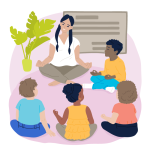Handle With Care: Supporting Young People During Crises
 The entire community is responsible for protecting and supporting children, especially in times of crisis. In empathizing with families, educators and community members who must respond to the needs of children as a traumatizing event unfolds, Learning for Justice gathered recommendations and resources to help guide conversations with young people and to manage potential subsequent actions and reactions.
The entire community is responsible for protecting and supporting children, especially in times of crisis. In empathizing with families, educators and community members who must respond to the needs of children as a traumatizing event unfolds, Learning for Justice gathered recommendations and resources to help guide conversations with young people and to manage potential subsequent actions and reactions.
Listen and Hold Space
Pay attention to how children respond to news about what is happening in the world around them. When something bad happens, it’s of immediate importance to young people to share their feelings or thoughts, so it will occupy their minds whether you discuss it or not. Encourage young people to journal and draw to share their thoughts, or allow them privacy if they choose not to express their feelings at the moment.
Provide a Sense of Safety
Young people need to know they are safe, so be intentional about fostering feelings of safety when they are in your care. Review safety procedures at home and at school and identify adults who children can go to if they feel threatened or unsafe.
As misinformation typically spreads rapidly following a crisis, adults should help young people vet information and have a critical eye for breaking news. Look for trustworthy sources and remain skeptical. Steer young people toward facts and big ideas; avoid speculation.
Limiting the consumption of traumatizing media content during a crisis is important to maintaining children’s sense of well-being. Carefully select what to watch together with children so they can discuss and share their feelings about what is happening.
Adults must keep explanations and discussions developmentally appropriate. For example, young children need brief, simple information balanced with reassurance that they are safe.
Model Empathy
Recognize that children may not only fear for themselves, so consider how crisis events might make them worry about losing parents, family members, teachers and others they depend on in their lives. For young children, give comfort and reassurance with gentle words, and don’t dismiss their fears.
Support young children with comfort and give them opportunities to play and share their feelings in multiple ways. Whether in the classroom or at home, engage in stress-reducing activities, such as creating art or utilizing a Peace Corner, where children can have a safe space to process their feelings privately.
Monitor reactions and recognize that trauma can manifest in various behaviors, including anger and disengagement. Commit to destigmatizing mental health issues. For example, separate conversations about violence from issues of mental health.
Brainstorm Action Items
Help young people translate feelings of hopelessness or apathy into opportunities to respond with productive action. Join them in brainstorming ways they can support survivors and families experiencing trauma. Activities might include fundraising, volunteering, donating clothes and personal items, attending vigils or protests, signing petitions and writing supportive letters to people affected by tragedy.
Embrace Self-Care and Seek Community-Care
Check in with your own feelings and give yourself grace for whatever comes up.
Remember that individual responses and the impact of violence may not be immediately clear, so be observant and maintain open communication, especially with young people. Sometimes anger can manifest in behaviors later, and sadness can become feelings of despair. If you or the children in your life are having a hard time coping with these events (for example, there are signs of sleeplessness, anxiety, depression, or behavioral concerns), please reach out for professional counseling support.
Excerpted from “Handle With Care: Supporting Young People During Crises” in Learning for Justice‘s digital magazine. Read the full article online for additional recommendations and resources that address topics such as discussing race, racism and police violence, gun violence in schools and communities, identity-based violence and hate incidents, natural disasters and more.
Source: Learning for Justice | Handle With Care: Supporting Young People During Crises, https://www.learningforjustice.org/magazine/handle-with-care-supporting-young-people-during-crises | A project of the Southern Poverty Law Center ©1991-2023
If you have concerns about your child or teen, CHC Care Coordinators can arrange a free 30-minute consultation so you can explore options with an expert. We invite you to call or email us at 650.688.3625 or careteam@chconline.org to set up an initial Parent Consultation appointment. CHC teletherapy services are available now.





